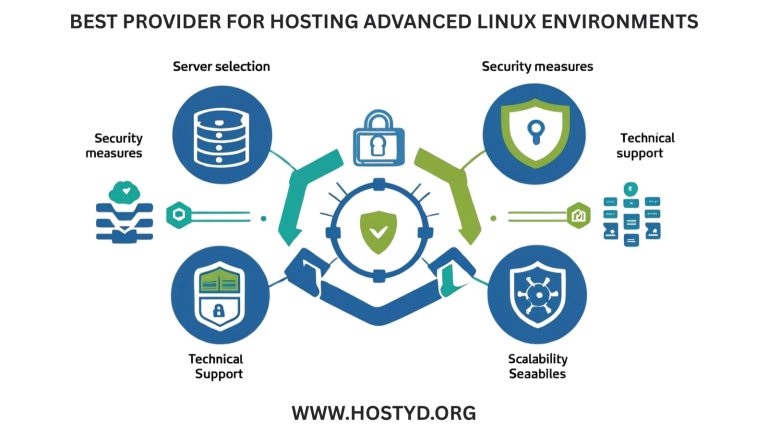How to Choose the Best Provider for Hosting Advanced Linux Environments

Choosing the right provider for Hosting Advanced Linux environments is essential for performance, security, and scalability. Whether you’re managing web apps, databases, or cloud services, selecting the right host can make or break your success.
Why Hosting Advanced Linux Is Crucial for Developers
Hosting Advanced Linux environments provides developers with flexibility, control, and powerful tools. Linux servers are known for their stability and compatibility with open-source software. Developers often choose Linux hosting for its robust performance and high customization levels.
Key Features to Look for in a Linux Hosting Provider
When evaluating providers, there are several key features to prioritize. These ensure your hosting environment runs efficiently and securely.
1. Compatibility with Advanced Linux Distributions
Look for providers that support various Linux distributions like Ubuntu, CentOS, Debian, and Fedora. Advanced users often require specific distributions for their applications. A flexible provider makes development easier and more efficient.
2. Root Access and SSH
Root access is crucial for users who want full control over the server. Secure Shell (SSH) access lets you manage your server remotely. This is essential for configuring and maintaining advanced Linux hosting environments.
3. Scalability Options
Your hosting needs may grow. Choose a provider that allows easy scaling of CPU, RAM, and storage. Cloud-based or VPS solutions offer on-demand resource allocation.
4. Security and Regular Backups
A reliable provider ensures strong security protocols and regular data backups. Firewalls, DDoS protection, and malware scanning should come standard. These protect your Linux environment from threats.
5. Performance and Uptime Guarantees
Select a provider with high uptime (99.9% or more) and solid performance metrics. SSD storage, advanced caching, and low latency networks improve speed and reliability.
Different Types of Hosting for Advanced Linux Environments
Understanding the available hosting types helps you match your needs with the right service.
1. Shared Hosting
Not ideal for advanced Linux applications. Shared hosting limits control and customization. It may work for beginners or simple projects.
2. VPS (Virtual Private Server) Hosting
VPS provides better control and isolation than shared hosting. It’s suitable for most advanced Linux hosting needs.
3. Dedicated Hosting
Dedicated servers give you complete control and powerful resources. Ideal for high-traffic websites or resource-heavy applications.
4. Cloud Hosting
Cloud hosting is scalable, flexible, and reliable. It’s excellent for modern Linux environments requiring dynamic resource allocation.
Questions to Ask Your Hosting Provider
Asking the right questions helps you make informed decisions.
1. What Linux distributions are supported?
Ensure your preferred Linux version is supported. The more choices you have, the better.
2. What level of access do I get?
Root access, SSH, and command-line control are vital for hosting advanced Linux setups.
3. How is server performance managed?
Check if the provider uses SSDs, load balancing, and performance monitoring tools.
4. What are the support options?
Look for 24/7 expert support with Linux experience. Quick and knowledgeable assistance is a must.
5. Are there any uptime guarantees?
A reputable provider will offer a service level agreement (SLA) with a high uptime guarantee.
Importance of Customer Support in Hosting Advanced Linux
When hosting complex environments, expert support is critical. Providers should offer Linux-trained staff, live chat, and fast response times. Look for a support team that can help troubleshoot issues quickly.
Benefits of Choosing Hostyd for Advanced Linux Hosting
At Hostyd, we specialize in Hosting Advanced Linux systems. We offer:
- Full root access and SSH support
- Compatibility with all major Linux distributions
- High uptime with enterprise-level hardware
- 24/7 expert Linux support
- Easy scalability and affordable pricing
We focus on giving developers the tools they need to succeed in building, managing, and scaling Linux-based applications.
Tips for Migrating to a New Linux Hosting Provider
Migrating your Linux environment doesn’t have to be complicated. Here’s how to simplify the process.
1. Backup Everything
Before moving, back up your entire system including databases, files, and configurations.
2. Test the New Environment
Set up a test version of your application. Ensure all services run correctly before switching over.
3. Coordinate the DNS Change
DNS changes can take time. Plan the switch during low-traffic periods.
4. Use Migration Tools
Many providers offer automated migration tools or managed migration services.
Final Thoughts on Hosting Advanced Linux Environments
Choosing the right provider for Hosting Advanced Linux setups can dramatically impact your success. Focus on features like full control, strong support, scalability, and performance. Providers like Hostyd offer everything you need to deploy and maintain a powerful Linux environment.
Make sure you ask the right questions, understand your needs, and don’t settle for a provider that can’t support your long-term goals. Hosting advanced Linux systems isn’t just about running software—it’s about enabling performance, stability, and growth.


